Your cart is currently empty!

Have you been noticing dozens of hairs on your pillow, or clogs in your shower drain? While losing a few hairs is normal, pulling out clumps or thinning patches could be a sign of hair loss. Before you reach for invasive treatments, consider Chinese herbs for hair loss.
Chinese medicine can help slow or stop hair loss and may even support hair regrowth. How? By treating the root causes of why we lose our hair in the first place.
What is Hair Loss?
The average scalp contains over 100,000 hair follicles that go through cycles of growth, rest, fall out, and regeneration. With so many hairs on our heads, we are unlikely to notice a major change from day to day. In fact, most people lose about 50-100 each day!
But when this cycle is interrupted and we notice increasing hair thinning and a lack of regrowth, there could be a bigger issue at play.
Common Types of Hair Loss
- Androgenetic Alopecia (Male Pattern Baldness, Female Pattern Baldness)
This is the most common type of men and women hair loss. It’s a hereditary condition that can begin anytime after puberty. It leaves a classic “ring” of hair, with the top of the head hairless. In women, this type of hair loss typically presents as thinning hair all over the head rather than batches of baldness.
- Alopecia Areata
Alopecia areata is hair loss caused by an autoimmune condition. The body attacks the hair follicles which prevents new hair growth. In this type of hair loss, hair tends to fall out in patches from the scalp, or the eyebrows or eyelashes.
- Tinea Capitis
Tinea capitis is hair loss caused by a fungal infection. Tinea capitis leaves circular bald patches as well as a red, itchy, irritated scalp. It typically occurs only in children.
- Telogen Effluvium
In this type of hair loss, hair growth stops when the follicles enter the “telogen” or resting phase. This is most often seen about three months after an intense illness, childbirth, or surgery. Thankfully, hair growth usually returns, especially with the help of Chinese medicine.
- Anagen Effluvium
Anagen effluvium is the hair loss that occurs due to chemotherapy. The hair quickly falls out as the medications stop the hair growth cycle, but will grow back after treatment is over.
How to Stop Hair Loss and Strengthen Your Hair
Losing hair is a natural part of life. But that doesn’t mean you have to accept thinning hair or a balding scalp just because you’re aging. There are several ways to strengthen your hair and prevent hair loss:
- Manage your stress.
Stress is one of the leading causes of hair loss. The more stressed we are, the more cortisol we produce. This increases inflammation in the body which can damage the hair follicles and prevent them from regrowing hair. Find stress relief activities you enjoy and practice them regularly. Exercise and meditation are good places to start!
- Give yourself a daily scalp massage.
Some researchers believe that poor blood circulation to the follicles could be at the root of hair loss. Others suggest that scalp massage helps promote stronger, thicker, and longer hair. Stimulating the scalp can help you bring nourishing blood flow to the follicles so they continue to produce new hair.Consider massaging an essential oil blend into the scalp to promote hair growth. Oils such as thyme, rosemary, lavender, and cedarwood (blended in a carrier oil) have been shown to improve hair loss conditions like alopecia.
- Check your hormone balance.
Hormone fluctuations are known to cause hair loss, especially in women. If you are experiencing hair loss along with other symptoms (like menstrual irregularities, postpartum issues, menopause, or thyroid conditions), consider getting your hormone levels checked. Then, see how Chinese herbs can help you restore a healthy hormone balance.
- Eat a healthy diet.
Like any other cell in the body, hair follicles need nutrients to grow hair. If you eat a poor diet, you are more likely to lack the compounds needed to grow healthy hair. Eat a diet with a wide range of fresh produce, B vitamins (which improve hair growth), and omega-3 fatty acids. These have been shown to support a healthy scalp and hair.
- Use Chinese herbs for hair loss and regrowth.
Chinese medicine has been used to treat hair loss and promote long, strong, shiny manes for centuries. Chinese herbal formulas typically work by supporting the body’s yin and blood – two substances that are required for a healthy head of hair. Chinese herbs can also help to reduce inflammation, improve circulation to the scalp, and relieve stress to combat the underlying root causes of hair loss.
Chinese Medicine and Hair Loss
If you are experiencing hair loss, Traditional Chinese medicine (TCM) can help.
In general, TCM works to stimulate hair growth by helping your body return to a state of balance. When we are in balance, our body has plenty of resources to allow all organ systems to function. Every cell in the body can do its job well. We have energy, bounce back from issues easily, and thrive.
Hair loss or thinning hair can be a sign that our bodies are out of balance. Here are some of the most common TCM patterns of imbalance that may cause changes in your hair:
- Blood Deficiency
In TCM, ample blood is needed to nourish the hair follicles and grow the hair. Without it, hair falls out or stops growing. Chinese herbs help increase blood by providing the body with the right nutrients to make more healthy blood cells. It also stimulates healthy blood flow so new blood can reach all areas of the body – including the scalp.
- Blood Stagnation
Since healthy hair requires healthy blood, blood stagnation is also a leading cause of hair loss in TCM. Blood stagnation occurs when inflammation or obstructions prevent the free flow of qi and blood through the body – including the scalp. Blood stagnation can also cause symptoms like pain, irritability, menstrual issues, and dusky or purple skin patches. Chinese herbs help move the blood and keep it flowing to the scalp so the hair follicles can start their regrowth cycle.
Chinese Medicine and Alopecia
Chinese herbs and acupuncture can both be used to treat alopecia. If you are experiencing hair loss due to alopecia, blood deficiency or stagnation could be at the root. A commonly used Chinese herb called he shou wu has been proven to help stop alopecia hair loss and regrow hair.
Is There a Chinese Hair Loss Treatment?
There is no single Chinese hair loss treatment. Instead, Chinese hair treatments use a range of natural therapies that support your individual constitution and type of hair loss for best results.
- Acupuncture
Acupuncture can be used to stimulate hair growth by stimulating the scalp. It can also reduce stress and other underlying imbalances leading to hair loss.
- Combing therapy
Combing therapy is an age-old practice related to tui na, or medical massage. It is used to stimulate the scalp, bring blood flow to the hair follicles, and encourage hair growth. In combing therapy, a wide-toothed comb glides along the scalp from front to back and back to front.
- Chinese herbs for hair loss
The most famous herb for hair loss is shou wu, but there are several different types of Chinese herbs and formulas that stimulate healthy hair growth. The right one for you will depend on your unique symptoms and scalp.
The Best Chinese Herbs for Hair Loss
Shou Wu Pian
Shou Wu Pian is a hair tonic known to stimulate hair growth, strengthen the hair, and slow the aging process. Its key herb is he shou wu, an herb proven to stimulate hair growth for thinning hair or alopecia.
-
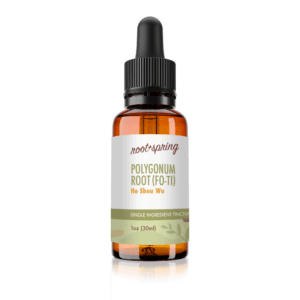 He Shou Wu (Polygonum Root or Fo-Ti) – Liquid Extract (Tincture)
Starting at $14.00
Add to CartSelect options
This product has multiple variants. The options may be chosen on the product page
He Shou Wu (Polygonum Root or Fo-Ti) – Liquid Extract (Tincture)
Starting at $14.00
Add to CartSelect options
This product has multiple variants. The options may be chosen on the product page
He Shou Wu (Fo-Ti)
If you don’t like to take pills, you can still get the benefits of He Shou Wu with this tincture. This formula is one of the most commonly recommended tinctures for those with hair loss (including alopecia), graying hair, weakness in limbs, dizziness, and aching back and knees. These signs all point to a weakness in the Kidney system.
Seven Treasures for Hair
Legend has it that this Chinese herbal formula was developed for an aging emperor who didn’t want his long black beard to turn gray. It is now used for those with prematurely graying hair, hair loss, and thinning hair. It can also be used for loose teeth, lower back pain, and other signs of aging.
Ban Tu Wan
Whereas other formulas are great for hair loss due to aging, Ban Tu Wan is a key formula for those who experience hair loss due to medical events like alopecia, postpartum, or chemotherapy. It still contains the hair-growing herb he shou wu, but also uses herbs that support and replenish the Liver and Kidney – two organ systems that are often involved in these conditions. Choose this formula if you are also experiencing dizziness, insomnia, memory loss, or extreme fatigue.
-
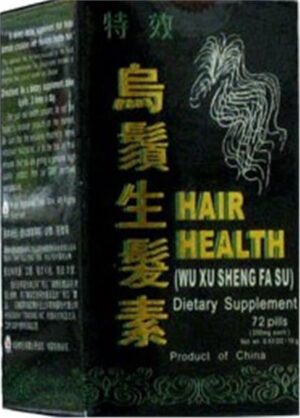 Wu Xu Sheng Fa Su Healthy Hair Supplement
Starting at $6.99
Add to CartSelect options
This product has multiple variants. The options may be chosen on the product page
Wu Xu Sheng Fa Su Healthy Hair Supplement
Starting at $6.99
Add to CartSelect options
This product has multiple variants. The options may be chosen on the product page
Wu Xu Sheng Fa Su
Like Seven Treasures, this tonic formula helps with premature greying and hair loss. It supports hair regeneration at the follicle. Because it supports general wellness and tonifies the Spleen and Stomach systems, it works as a general health tonic, too!
-
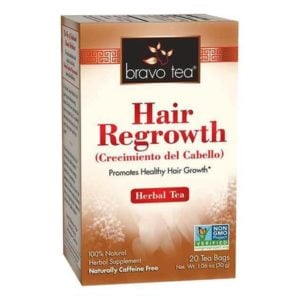 Hair Regrowth Tea – by Bravo Tea
Starting at $6.99
Add to CartSelect options
This product has multiple variants. The options may be chosen on the product page
Hair Regrowth Tea – by Bravo Tea
Starting at $6.99
Add to CartSelect options
This product has multiple variants. The options may be chosen on the product page
Hair Regrowth Tea
Hair Regrowth Tea by Bravo Teas combines the benefits of he shou wu with other herbs that support the Liver and Kidneys in a convenient daily herbal tea. This tea can help support your hair growth efforts, or slow hair loss when taken preventatively.
Restore Your Hair Growth and Confidence with Chinese Herbs
Chinese medicine offers a natural and effective way to support your scalp and hair follicles – from the root! Shop now to learn more about our Chinese herbs for hair loss.
Share This
Table of Contents
- What is Hair Loss?
- How to Stop Hair Loss and Strengthen Your Hair
- Chinese Medicine and Hair Loss
- The Best Chinese Herbs for Hair Loss
- Restore Your Hair Growth and Confidence with Chinese Herbs
About the Author
Blog Categories
- Adaptogen Articles (8)
- Brain Health Articles (9)
- Chinese Medicine Basics Articles (13)
- Chinese Medicine for Pain Articles (15)
- Chinese Medicine for Pets Articles (3)
- Chinese Medicine for Skin Conditions Articles (6)
- Chinese Medicine Formula Articles (6)
- Chinese Medicine Sleep Articles (4)
- Conditions & Concerns Articles (24)
- Digestive Issues (5)
- Eating for the Seasons (2)
- Health & Lifestyle Articles (17)
- Heart Health Articles (4)
- In the News (1)
- Medicinal Mushrooms Articles (7)
- Men's Health Articles (8)
- Scholarships (5)
- Uncategorized Articles (9)
- Weight Loss, Diet & Obesity Articles (5)
- Women's Health Articles (10)
Articles Related To Best Chinese Herbs for Hair Loss
-
Ahhh, Spring! We all love to welcome its return after a long and dreary winter. The sun shines upon us, we have more energy, the temperature warms up, and new growth reminds us that there is always time for a fresh start. New beginnings and brighter days are ahead. And then…the seasonal woes ramp up.…
-
These days, trying to stay on top of a successful career, a clean home, a vibrant social life, and healthy habits can feel impossible. We burn the candle at both ends to try to have it all, which leaves many of us feeling burned out. But burnout is more than a buzzword – it’s a…
-
Of all the senses, vision is one of the most essential. Yet, few people know how to take care of their eyes naturally. Unfortunately, many of our daily habits sabotage our eye health and vision. Excessive screen time from phones and computers tires the eyes and impairs our vision. Plus, pollution, makeup, and environmental factors…
-
Ever feel like your heart is dancing to its own beat? You may be experiencing Atrial Fibrillation (commonly known as AFib), which is a condition that causes irregular heartbeats. Having frequent palpitations or an irregular heartbeat can be quite unsettling, plus it may bring potential health risks along with it. While modern medicine offers various…
-
Struggling to breathe? That’s a feeling no one wants to experience. Unfortunately, for over 262 million people across the world, conditions like asthma can quite literally “take your breath away.” But beyond inhalers and mediations, is there anything you can do to reduce asthma attacks – or even stop them from occurring altogether? Asthma is…


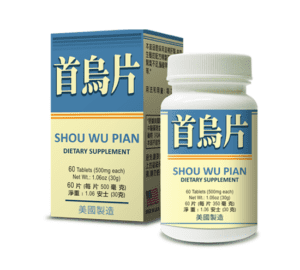 Shou Wu Pian – by Lao Wei
Shou Wu Pian – by Lao Wei
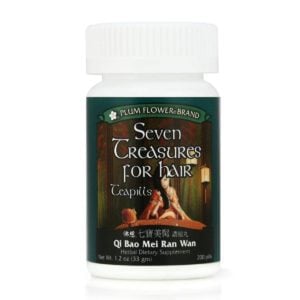 Plum Flower – Seven Treasures For Hair Teapills (Qi Bao Mei Ran Wan)
Plum Flower – Seven Treasures For Hair Teapills (Qi Bao Mei Ran Wan)
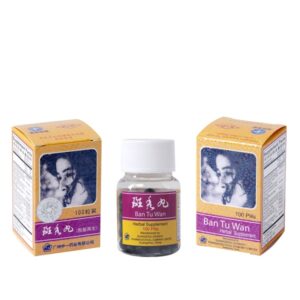 Ban Tu Wan (Alopecia Areata Pill)
Ban Tu Wan (Alopecia Areata Pill)